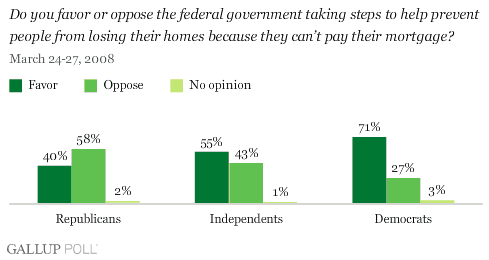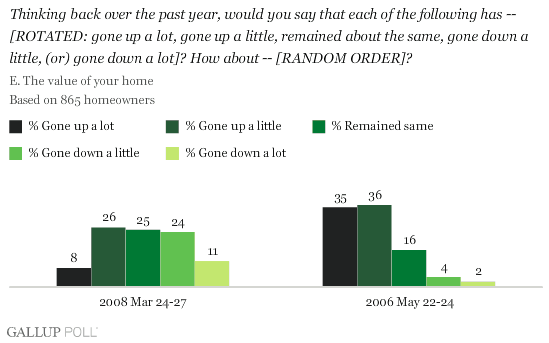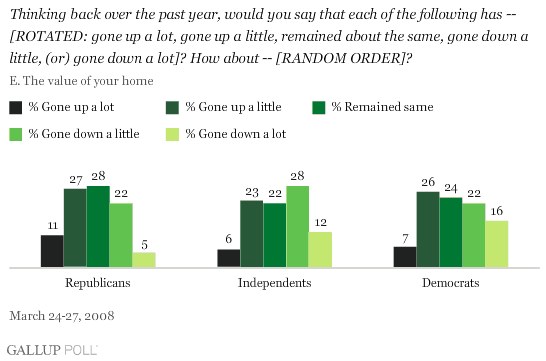PRINCETON, NJ -- According to a new ������ Poll, conducted March 24-27, 58% of Republicans oppose having the federal government take steps to prevent people from losing their homes because they can't pay their mortgages while, in sharp contrast, 71% of Democrats and 55% of independents support the idea. Overall, 56% of Americans favor and 42% oppose government intervention.

Democrats and Republicans Differ Over a Homeowner Bailout
Given the fall in housing prices and widespread foreclosures, it is not surprising that both Democratic presidential candidates have come out in favor of helping distressed homeowners. On the other hand, Republican presidential nominee John McCain's continued opposition to such bailout efforts is something of a surprise, particularly in light of the bipartisan efforts in the Senate to formulate and pass an emergency housing bailout plan. Interestingly, McCain's reluctance to support a housing bailout effort is not one of his famous maverick political positions, but instead, is fully in line with the views of Republican voters.
In this regard, it seems Democrats and Republicans tend to differ over helping homeowners avoid foreclosure partly on philosophical grounds. Democrats tend to be willing to have the federal government get involved with helping distressed homeowners suffering in the current economic environment, while their Republican counterparts seem to believe these situations should be left to the private sector and free markets to resolve. But there may also be another significant and less obvious reason for these differences between the political parties, and that has to do with the perceptions of their constituents concerning what has happened to the value of their homes over the past year.
Democrats and Republicans Also Differ About Home Values
Thirty-five percent of homeowners say the value of their home has gone down a lot (11%) or a little (24%) over the past year; 34% say their home's value has gone up a lot (8%) or a little (26%); and 25% say the value of their home has remained the same. This may seem surprisingly positive given all the pain emanating from the nation's real estate markets. However, comparing the current housing sector distress to the conditions of just two years ago provides some perspective on Americans' current pain. In May 2006, 71% of homeowners said their home's value had gone up a lot (35%) or a little (36%) and only 6% said the value of their home had gone down a lot (2%) or a little (4%) during the prior year.

Interestingly, given their political positions on aiding distressed homeowners, more Democrats say the value of their home has declined (38%) rather than increased (33%) over the past year. Similarly, 40% of independents say the value of their home has fallen while only 29% say it has increased. In sharp contrast, more Republicans say the value of their home has increased (38%), rather than declined (27%), over the past 12 months.
Forty-seven percent of homeowners in the West (47%) report decreased home values, surpassing the Midwest (43%) -- the region of the country that has generally been associated with the most severe economic distress during recent years. Those in the South (24%) are only about half as likely as those in the West to say their home's value has fallen, while homeowners in the East (31%) are in between.
Upper-income homeowners are more likely to report a decline in the value of their home. Forty-one percent of those making $75,000 or more a year say the value of their home has declined over the past year, compared to 34% of those making $35,000 to $74,999 and 28% of those making less than $35,000.

Enlightened Self-Interest
Economic theory suggests that the best way to resolve the current housing debacle is to allow and perhaps even encourage housing prices to drop so the real estate markets can clear and get back to normal functioning as soon as possible. Although behavioral economics may eventually alter this analysis, the idea of "sunk costs" -- that past investments and potential losses should not influence future decisions -- is still a viable concept, but one that doesn't recognize the pain associated with millions of homeowners losing their homes, not to mention the millions of investors holding their mortgages. Still, it is not unreasonable for someone to argue that people should benefit from making good economic investment decisions and suffer from doing the reverse.
On the other hand, numerous and frequent foreclosures can do significant damage not only to local housing values but also to the ability of local real estate markets to function. Given today's widespread perceptions of declining housing values as reflected in this recent ������ Poll, it is hard for home buyers to make a purchase when the value of the home they are buying may plunge in the months ahead. Similarly, it is hard for home sellers to sell at a distressed price when the value of the home they are selling may stabilize or even increase significantly during the months ahead.
In a very real sense, many of today's residential real estate markets are just as dysfunctional, if not more so, than parts of the global credit markets. As a result, it may be in everyone's enlightened self-interest for the administration and Congress to view the residential real estate markets just as the Fed and the Treasury viewed -- that is, as an effort to promote stability and the orderly operation of the residential real estate markets.
In sum, there is an argument to be made that reasonable compassion -- not to mention political reality -- suggests that Congress should act to stabilize residential real estate, and the majority of Americans support such actions.
Survey Methods
Results for this panel study are based on telephone interviews with 1,005 national adults, aged 18 and older, conducted March 24-27, 2008. Respondents were drawn from ������'s household panel, which was originally recruited through random selection methods. The final sample is weighted so it is representative of U.S. adults nationwide. For results based on the total sample of national adults, one can say with 95% confidence that the maximum margin of sampling error is ±4 percentage points.
For results based on the sample of 865 homeowners, the maximum margin of error is ±4 percentage points.
In addition to sampling error, question wording and practical difficulties in conducting surveys can introduce error or bias into the findings of public opinion polls.
